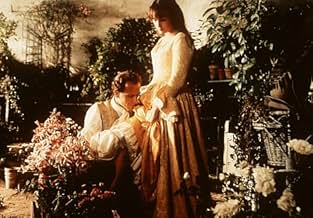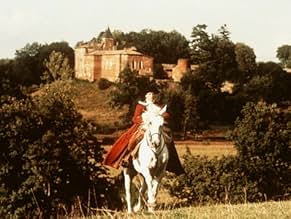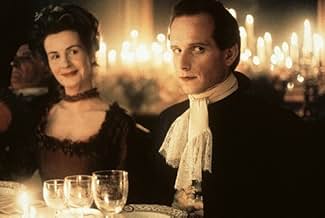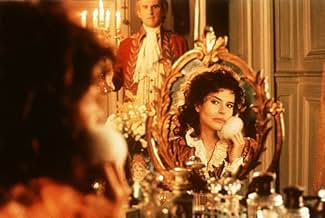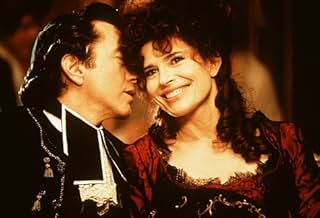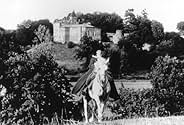IMDb-BEWERTUNG
7,3/10
8416
IHRE BEWERTUNG
Füge eine Handlung in deiner Sprache hinzuTo get royal backing on a needed drainage project, a poor French lord must learn to play the delicate games of wit at court at Versailles.To get royal backing on a needed drainage project, a poor French lord must learn to play the delicate games of wit at court at Versailles.To get royal backing on a needed drainage project, a poor French lord must learn to play the delicate games of wit at court at Versailles.
- Für 1 Oscar nominiert
- 20 Gewinne & 17 Nominierungen insgesamt
Judith Godrèche
- Mathilde
- (as Judith Godreche)
Empfohlene Bewertungen
I have seen this film recently on video after having missed it at the cinema and on TV. I knew it would be all about cruelty of words and superficiality of elites. Indeed, this film is a true gem, very well played, sharp and quick. It tells the story of a young provincial nobleman discovering the Versailles Court as he tries to get funding for his project. What he finds will lead the nobility to its brutal end 6 years later: futility, self-conceit, disinterest to the people's problems, superficiality of relationships (all of which still pervade it modern French elite, to some respects as was evident from revelations of Mitterrand's shameful reign). Of course the political message is important. But equally if not more important -or pleasurable- are the dialogues. French can be so brutal, insidious, cruel, tortured, witty when used a propos that I'm not sure the non-French speakers could get the most of the dialogues. Certainly the absolutely brilliant rhymes contest would be somehow lost in English subtitles. A very good 9/10 for this movie, and a bit less if you don't get the dialogues.
Ridicule is a French film which takes place in 1783, a few years before Louis XVI lost the ability to wear a hat; where "...in this country, vices are without consequence, but ridicule can kill." The film is about the effect of wit and word play on people's lives and careers. Malicious, mannered and highly enjoyable. Charles Berling, Jean Rochefort, Bernard Giraudeau and Fanny Ardant are excellent. A man would be a fool not to want to bed Ardant, and even more a fool to trust her. The love affair between Berling and his deep-diving sweetheart is amusing and endearing.
The film is sumptuously mounted. The dialogue is so clever a knowledge of French might be in order, but the English subtitles do a superb job of conveying the witty, cruel, self-serving word play.
The film is sumptuously mounted. The dialogue is so clever a knowledge of French might be in order, but the English subtitles do a superb job of conveying the witty, cruel, self-serving word play.
I have to say that this film is certainly not for an audience with a predilection for sophomoric or low-brow "hu-mah". The action in this film is nearly entirely a matter of verbal cut and thrust and quick repartee. A period piece shot in pre-revolutionary France in the days of King Louis and Marie Antoinette, Ridicule portrays an era when wit could earn a passport into courtly favor, and one verbal faux pas could ruin a man's reputation and position in society. Charles Berling's performance as Ponceledon, the rustic nobleman trying to bring his petition to drain the disease-infested swamps of his region before the King of France, is in a word, superb... Fanny Ardant is also a well-cast Madame de Blayac, the dexterously duplicitous countess who appears disposed towards aiding Ponceledon in his suit. Ridicule is a genuinely delightful comedy. I recommend it highly even to those who do not speak French. My rating: 9/10.
This reminds me a lot of Dangerous Liaisons (1988) and Valmont (1989) in its cynicism and sharp wit. Set in France during the same time period (the eve of the French Revolution--that's the eighteenth century, reviewers), Ridicule concentrates not so much on sexual intrigues (although there is plenty of that) but on cynical wit as though in homage to Voltaire, France's master of satire whose spirit is suffused throughout.
First a warning. Don't let the rather gross crudity of the opening scene mislead you. That is meant merely as satire, not as a presaging of further crudities to come. It is also meant as a kind of cinematic joke since there is no comparable female nudity in the entire film. Indeed, there is no comparable, shall we say "expression," anywhere in legitimate filmdom that I am aware of. So let it pass or close your eyes.
Charles Berling stars as Gregoire Ponceludon de Malavoy, a country engineer who comes to Versailles to get financial backing to drain a swamp to save the peasants who are dying of mosquito-borne disease. ("Peasants feed aristocrats as well as mosquitos.") He discovers very quickly that a way to an audience with Louis XVI is through gaining a reputation as a clever courtier. Guided by M. Bellegarde (Jean Rochefort), a retired courtier himself, Ponceludon quickly picks up the games of wit and ridicule that reign at court. His quick and clever mind and youthful good looks gain the attention of the king's mistress, Madame de Blayac (Fanny Ardant) who demonstrates how access to the king can come through her bedroom. Ponceludon is sincere only in his desire to drain the swamp and so readily allows himself to become another of Blayac's lovers in exchange for a chance to present his program to Louis XVI.
At the same time he meets Bellegarde's daughter Mathide (Judith Godrèche), an idealistic beauty with a scientific bent, who is betrothed to a dying old man of wealth and position. They fall in love, but their differing agendas keep them apart.
What makes this film such a delight is the delicious way it satirizes the decadent court of Louis XVI. The dramatic irony is superb and absolute in the sense that at no time does director Patrice Leconte give even the slightest hint that any of the byzantine sycophants at court are aware that Danton and the Terror await them. Throw in the impending Industrial (and scientific) Revolution symbolized in the form of Ponceludon and Mathide, and the ancien régime with its antiquated feudal titles and corrupt privilege is seen for what it was, a parasitic anachronism, ripe to rot for destruction.
The sets, the direction and especially the acting are excellent. Veteran Rochefort is particularly good in a part that depends on a directive and expressive face amid the whispers at court. Berling is smooth and believable as a man with a noble mission, adroit at repartee, love and dueling, a modest and earnest hero.
Godrèche is good, but seems a little restrained here. She is an impossibly healthy, handsome beauty no man could resist. I first saw her as a 17-year-old in The Disenchanted (1990) where her adolescent charm was carefully and craftily displayed by director Benoît Jacquot. Here Leconte concentrates on her strength of character.
Fanny Ardant's Madame de Blayac is a Machiavellian mistress of love's duplicity, very much like the Marquise de Merteuil from Dangerous Liaisons and Valmont. Her performance compares favorably with that of Glenn Close and Annette Bening, respectively, although there is an earthy quality to Ardant that seems most realistic. Her character is also more vulnerable.
The sets are sumptuous without being artificially showy. The gray, high-topped wigs and the beaked-nosed masks at ball are charming and, along with the gilded attire, the caked makeup, etc., somehow suggest the true state of costume and personal hygiene circa 1784, reminding me that in those days people did not generally wear underpants or take showers.
Some bon mots:
"The soul of wit is to know one's place."
When asked by the king to say something witty about the king himself, Ponceludon returns: "The king is not a subject." The king asks if this is not a (lowly) pun, but is assured that it is a "play on words."
When Blayac discerns that Ponceludon is not entirely smitten with her, she responds, "Learn to hide your insincerity so that I may yield without dishonor."
The film closes with a scene in England on a cliff overlooking the English channel. Bellegarde and another reflect on the changes after the revolution: "Wit was the very air we breathed." "Now the bloated rhetoric of Danton rules in place of wit." Bellegarde's hat is blown off by the wind. His companion remarks: "Better your hat than your head."
By the way, the subtitles (and this is usually not the case) are excellent, inventive and faithful enough, while comfortably brief, to have been done by a professional translator instead of by someone handy who is passably bilingual.
(Note: Over 500 of my movie reviews are now available in my book "Cut to the Chaise Lounge or I Can't Believe I Swallowed the Remote!" Get it at Amazon!)
First a warning. Don't let the rather gross crudity of the opening scene mislead you. That is meant merely as satire, not as a presaging of further crudities to come. It is also meant as a kind of cinematic joke since there is no comparable female nudity in the entire film. Indeed, there is no comparable, shall we say "expression," anywhere in legitimate filmdom that I am aware of. So let it pass or close your eyes.
Charles Berling stars as Gregoire Ponceludon de Malavoy, a country engineer who comes to Versailles to get financial backing to drain a swamp to save the peasants who are dying of mosquito-borne disease. ("Peasants feed aristocrats as well as mosquitos.") He discovers very quickly that a way to an audience with Louis XVI is through gaining a reputation as a clever courtier. Guided by M. Bellegarde (Jean Rochefort), a retired courtier himself, Ponceludon quickly picks up the games of wit and ridicule that reign at court. His quick and clever mind and youthful good looks gain the attention of the king's mistress, Madame de Blayac (Fanny Ardant) who demonstrates how access to the king can come through her bedroom. Ponceludon is sincere only in his desire to drain the swamp and so readily allows himself to become another of Blayac's lovers in exchange for a chance to present his program to Louis XVI.
At the same time he meets Bellegarde's daughter Mathide (Judith Godrèche), an idealistic beauty with a scientific bent, who is betrothed to a dying old man of wealth and position. They fall in love, but their differing agendas keep them apart.
What makes this film such a delight is the delicious way it satirizes the decadent court of Louis XVI. The dramatic irony is superb and absolute in the sense that at no time does director Patrice Leconte give even the slightest hint that any of the byzantine sycophants at court are aware that Danton and the Terror await them. Throw in the impending Industrial (and scientific) Revolution symbolized in the form of Ponceludon and Mathide, and the ancien régime with its antiquated feudal titles and corrupt privilege is seen for what it was, a parasitic anachronism, ripe to rot for destruction.
The sets, the direction and especially the acting are excellent. Veteran Rochefort is particularly good in a part that depends on a directive and expressive face amid the whispers at court. Berling is smooth and believable as a man with a noble mission, adroit at repartee, love and dueling, a modest and earnest hero.
Godrèche is good, but seems a little restrained here. She is an impossibly healthy, handsome beauty no man could resist. I first saw her as a 17-year-old in The Disenchanted (1990) where her adolescent charm was carefully and craftily displayed by director Benoît Jacquot. Here Leconte concentrates on her strength of character.
Fanny Ardant's Madame de Blayac is a Machiavellian mistress of love's duplicity, very much like the Marquise de Merteuil from Dangerous Liaisons and Valmont. Her performance compares favorably with that of Glenn Close and Annette Bening, respectively, although there is an earthy quality to Ardant that seems most realistic. Her character is also more vulnerable.
The sets are sumptuous without being artificially showy. The gray, high-topped wigs and the beaked-nosed masks at ball are charming and, along with the gilded attire, the caked makeup, etc., somehow suggest the true state of costume and personal hygiene circa 1784, reminding me that in those days people did not generally wear underpants or take showers.
Some bon mots:
"The soul of wit is to know one's place."
When asked by the king to say something witty about the king himself, Ponceludon returns: "The king is not a subject." The king asks if this is not a (lowly) pun, but is assured that it is a "play on words."
When Blayac discerns that Ponceludon is not entirely smitten with her, she responds, "Learn to hide your insincerity so that I may yield without dishonor."
The film closes with a scene in England on a cliff overlooking the English channel. Bellegarde and another reflect on the changes after the revolution: "Wit was the very air we breathed." "Now the bloated rhetoric of Danton rules in place of wit." Bellegarde's hat is blown off by the wind. His companion remarks: "Better your hat than your head."
By the way, the subtitles (and this is usually not the case) are excellent, inventive and faithful enough, while comfortably brief, to have been done by a professional translator instead of by someone handy who is passably bilingual.
(Note: Over 500 of my movie reviews are now available in my book "Cut to the Chaise Lounge or I Can't Believe I Swallowed the Remote!" Get it at Amazon!)
"Ridicule" confirms well a thing: Patrice Leconte is one of the most talented French film-makers that French cinema has known. His gift comes from the fact that ke knows how to find original and eye-catching subjects for his movies and he also knows how to make them fascinating (watch "mister Hire" or "the hairdresser's wife" to be aware of it).
Here, he chose to broach a make his movie around a feeling that men always dreaded: ridicule. The action takes place in 1780, in the reign of Louis XVI. A young noble (Charles Berling) intends to get a meeting with the king, in Versailles. Indeed, he'd like him to lend important sums of money so as to drain marshes infected by mosquitos. This action will enable to save hundreds of peasants. But what Berling doesn't know is that he's not the only one who wants to get a meeting with the king. Hundreds of nobles like him feel the same thing. Above all, according to an elderly noble (Jean Rochefort), when you're in the court of a king, you have to avoid the ridicule which consequences can be disastrous. Berling will learn it, will face it and will just avoid it.
You could compare the court of Louis XVI as a jungle where only the strong survive. The strong are those who are quick-witted and skillful-minded. Ridicule invades the weak and leads them to disgrace, even suicide. With this movie, Leconte's aim is at denouncing vanity and hypocrisy of courtiers in the court of the king who take advantage of their privileged situation.
An outstanding and precise film-making, a dazzling performance especially Jean Rochefort and some powerful cues ("now, you mustn't make a single mistake" said Rochefort to Berling when the last one's going to meet the king). Obviously, the movie doesn't lack ironical humor: when the king asks to a courtier: "I hope it's not a pun" and the courtier replies: "no, Sir, it's a play on words". Play on words and pun mean the same thing.
At the end, a brilliant movie rightly awarded in France where it won the Oscar for the Best movie in 1997
Here, he chose to broach a make his movie around a feeling that men always dreaded: ridicule. The action takes place in 1780, in the reign of Louis XVI. A young noble (Charles Berling) intends to get a meeting with the king, in Versailles. Indeed, he'd like him to lend important sums of money so as to drain marshes infected by mosquitos. This action will enable to save hundreds of peasants. But what Berling doesn't know is that he's not the only one who wants to get a meeting with the king. Hundreds of nobles like him feel the same thing. Above all, according to an elderly noble (Jean Rochefort), when you're in the court of a king, you have to avoid the ridicule which consequences can be disastrous. Berling will learn it, will face it and will just avoid it.
You could compare the court of Louis XVI as a jungle where only the strong survive. The strong are those who are quick-witted and skillful-minded. Ridicule invades the weak and leads them to disgrace, even suicide. With this movie, Leconte's aim is at denouncing vanity and hypocrisy of courtiers in the court of the king who take advantage of their privileged situation.
An outstanding and precise film-making, a dazzling performance especially Jean Rochefort and some powerful cues ("now, you mustn't make a single mistake" said Rochefort to Berling when the last one's going to meet the king). Obviously, the movie doesn't lack ironical humor: when the king asks to a courtier: "I hope it's not a pun" and the courtier replies: "no, Sir, it's a play on words". Play on words and pun mean the same thing.
At the end, a brilliant movie rightly awarded in France where it won the Oscar for the Best movie in 1997
Wusstest du schon
- WissenswertesIt is worth noting the presence of a real historical figure, father Charles Michel de l'Épée. The abbot de l'Épée was one of the first to take an interest in the issue of public education for the deaf, giving priority to sign language as a language of instruction.
- PatzerAround 44 min, when Grégoire is talking with Madame de Blayac, her left hand is touching the table, but in the next shot it's just hanging on the chair's the armrest.
- Zitate
Gregoire Ponceludon de Malavoy: Peasants feed aristocrats as well as mosquitoes.
Top-Auswahl
Melde dich zum Bewerten an und greife auf die Watchlist für personalisierte Empfehlungen zu.
- How long is Ridicule?Powered by Alexa
Details
- Erscheinungsdatum
- Herkunftsland
- Sprache
- Auch bekannt als
- Ridicule
- Drehorte
- Parc du Château de Versailles, Versailles, Yvelines, Frankreich(palace garden and ponds)
- Produktionsfirmen
- Weitere beteiligte Unternehmen bei IMDbPro anzeigen
Box Office
- Budget
- 50.000.000 FRF (geschätzt)
- Bruttoertrag in den USA und Kanada
- 1.979.768 $
- Weltweiter Bruttoertrag
- 1.979.768 $
Zu dieser Seite beitragen
Bearbeitung vorschlagen oder fehlenden Inhalt hinzufügen

Oberste Lücke
By what name was Ridicule - Von der Lächerlichkeit des Scheins (1996) officially released in India in English?
Antwort

